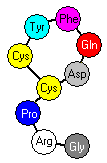 |
Men can have none, one, or two copies of the RS3 334 section, and the higher the number of copies, the worse men scored on a measure of pair bonding. Not only that, men with two copies of RS3 334 were more likely to be unmarried than men with one or none, and if they were married, they were twice as likely to have a marital crisis.
The same gene section in RS3 334 that codes for vasopressin was shown to affect signalling in the amygdala, a part of the brain linked to trust. Another study found that people with autism, which is characterised by unusual social behaviour, often have multiple copies of RS3 334.
The association between this gene and behavior is based on a correlation. There have been no studies to show (or not show) that the gene is a cause of the behavior. Therefore, the suggestion that possessing this gene affects bonding is a hypothesis that remains to be tested.
Excerpted from: Monogamy gene found in people